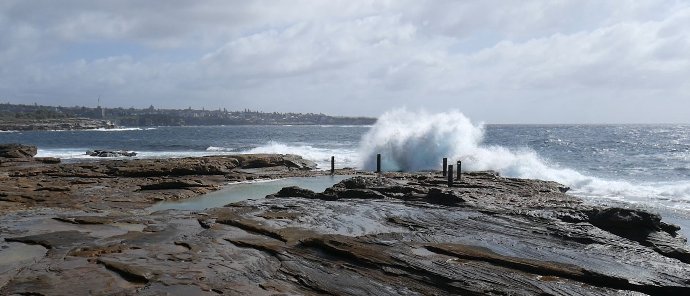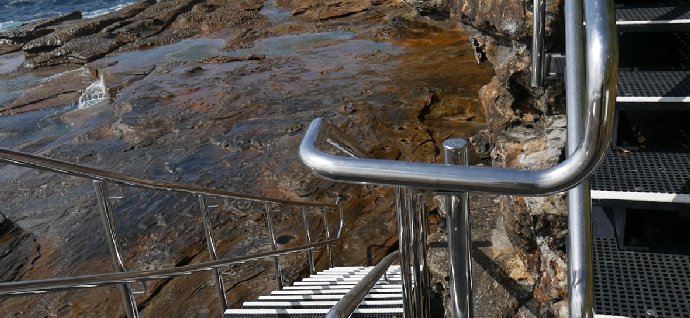Coogee Media
HISTORY | STORIES | BEYOND BLOG & CREATE PEOPLE |
IVO ROWE POOLSouth CoogeeWho was it named after? At the end of Bunya Parade, South Coogee, a set of stairs lead down to the Ivo Rowe Pool. (It is often mistakenly called the Ivor Rowe Pool - but the first word is actually Ivo). It is one of the smallest ocean pools along the coast and is a natural, shallow rock pool perfect for wading or cooling down. Nestled under the cliff face and on the ocean rock platform, the small, shallow ocean pool is popular among locals for its natural beauty. A new staircase has just been installed by Randwick City Council to improve safety and accessibility to the rockpool. It replaces an old concrete, rocky pathway, and is constructed of durable fibre reinforced polymer mini-mesh and stainless steel to protect it from the harsh coastal elements.
 Ivo Rowe Pool, South Coogee
History of the Pool Tracking down the origin of the name seemed, at first, a simple enough task but turned into a bit of detective story taking us down many side passageways and alleyways of history.
Ivo Rowe Ivo Rowe enlisted in the Australian Army (Militia) as a Captain in the Ordinance Corps during World War Two, and had a hand in the acceptance of the famous Owen Sub-machine gun into service with the Army.
Rowe Family Ivo married Ellen Coleman in 1911 at Paddington. Their first daughter, Merle Isabella was born at Rockdale in 1915. Other daughters Nancy and Jean followed. By 1930, according to Sands Directories, the Rowe family was living at 13 Evelyn Street, Coogee.
Ivo or Ivor? An old legacy sign on site still refers to it as "Ivor Rowe Pool", but after we pointed the error out to Randwick City Council, their communications and online references now gives it the correct name of "Ivo Rowe Pool". Perhaps as the current round of improvement are completed, new signage will be installed with the correct name.
As an aside, another person called "Ivo" was Ivo Bligh, who became the 8th Earl of Darnley, (1859 - 1927), a British noble, parliamentarian and cricketer. He
is best remembered in Australia as captaining the first ever England Test cricket team to visit Australia when the Ashes were at stake in 1882/83. While in
Australia, Bligh met and married an Australian girl, Florence Rose Morphy (1869-1944), daughter of John Stephen Morphy, of Beechworth, Victoria, in February 1884.
She had been a music teacher at Rupertswood, where her future husband had stayed during his tour of Australia. The Ashes urn has a poem inscribed on its side
beginning with the words: When Ivo goes back with the urn, the urn;The Bligh family had strong Cornish connections, so maybe that also is where the "Ivo" comes from. At any rate, it shows that Ivo Rowe's first name is not unique.
Controversy Both my husband and I approve of our prospective sons-in-law. The girls will be married in the city if they cannot be married locally. You'd go far before you would find nicer boys. They are a lovely shade of light brown and very clean. Peter has six toothbrushes. Peter's family owns a copra plantation in the Celebes. Paul's father was headmaster at a Celebes Grammar School." In July 1945, it was reported that Nancy and Petrus welcomed a newly-born son, Willem Leslie Tangilisam, into the world at the at Lucerne private hospital, in Avoca Street. Randwick. In the late 19th century and into the 20th century, Australian-born women could loose their citizenship (actually British Subject-ship) and be deported by marrying a non-British alien who was an "aboriginal native of Asia, as part of the White Australian Policy. It is a matter of complex administrative and citizenship law, and I am not exactly sure of when during the 20th century, this no longer applied, but may have lasted until the Nationality and Citizenship Act of 1948. This may have had implications for Rowe's daughters. Were they and their new husbands allowed to stay in Australia? There was also the complicating factor of the Dutch colonial administration's campaign against the Indonesian revolutionary movement for independence. The Dutch were doing all they could to ensure their personnel who had been located in Australia because of the War (i.e. military, seamen, prisoners, administrators, etc.) moved back to "the Dutch East Indies" to support their struggle against the independence movement. We located the following index entries for records stored at the National Archives of Australia. Until the covid19 lockdown is over, and we get a chance to visit the Archives and retrieve the records, we cannot be certain, but they do tend to raise the suspicion that Rowe's daughters may have been caught up in the arcane provisions of the now defunct White Australia Policy:
Circumstances could not have been easy for the two couples. According to Jean & Paul Umpel's daughter, Jean did not follow her husband back to Indonesia, and they eventually divorced. Her sister, Nancy, got as far as Singapore with her young son Willem (Bill), but decided to return back home, and also eventually divorced. Both sisters remarried.
Ivo Rowe's Legacy Jean passed away in 2019 aged 94, a resident of Southern Cross Care at South Coogee. Nancy passed away in 2020 aged 93. Eldest daughter Merle Isabell Rowe married twice but did not have any children. She died in Rose Bay in 2019, aged 104. No 13 Evelyn Street, originally a Californian bungalow style home, was sold in 2012 and has since been rebuilt. Ivo and Ellen Rowe's legacy are their grandchildren, great-grandchildren and great-great-grandchildren and the beautiful, cool, refreshing waters of the Ivo Rowe rock pool at South Coogee. References & Notes
Copyright © Coogee Media All rights reserved
|
